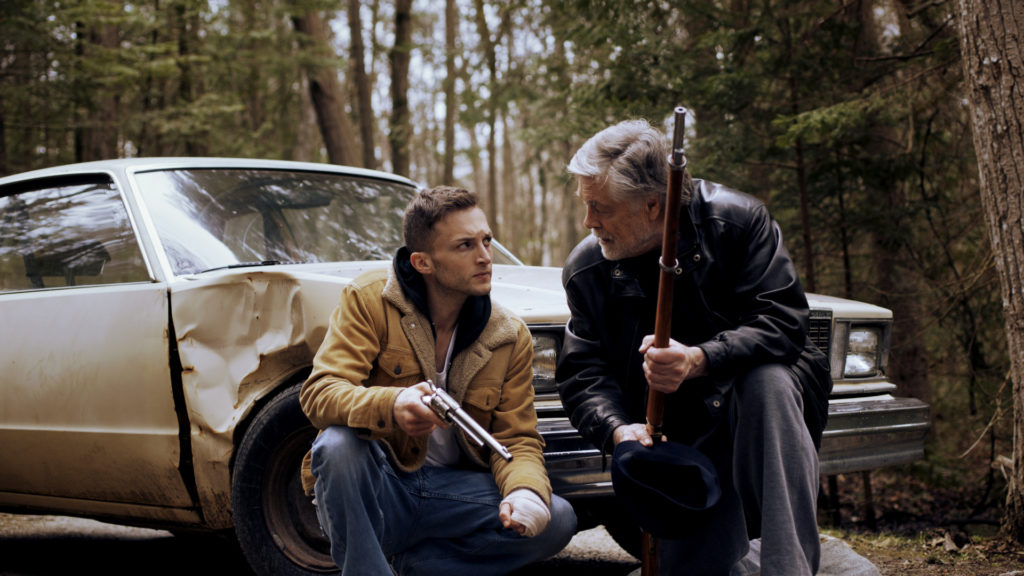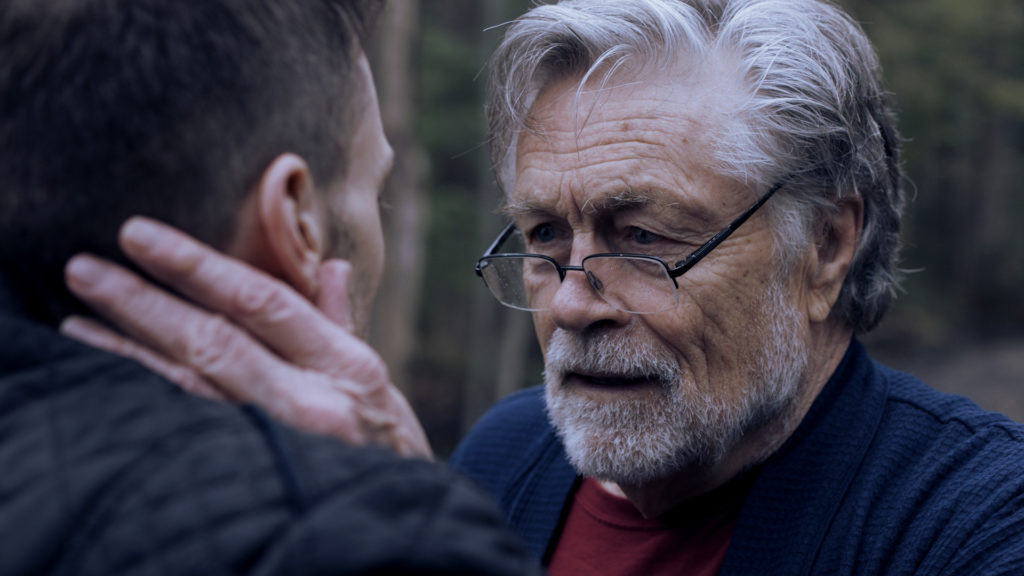Robbery is a solid drama that tells the compelling story of Frank (Art Hindle), a cerebral career criminal suffering from dementia. When his son, Richie (Jeremy Ferdman), finds himself the target of a dangerous organization to whom he owes money, Frank must come out of retirement and use the remnants of his mind to save his son.
I talked with writer/director Corey Stanton to see where this surprisingly unique story came from.
Shahbaz Khayambashi: Robbery had its world premiere at Toronto After Dark, yet it’s not typically the sort of movie that would play there – in form or content. What made you submit your film to TAD? How has the film been received on the festival circuit?
Corey Stanton: On paper, Robbery doesn’t seem like the typical film for Toronto After Dark, a festival which usually veers more into the horror genre. However, in its call for entries, I noticed that After Dark is open to all kinds of genre films; that the festival programmers are great champions of local independent content, and that TAD festival-goers are some of the most passionate on the circuit. Seeing as Robbery was indeed a local indie effort, featuring a wonderful Canadian cast and crew that includes After Dark favourite Art Hindle, I was hopeful that we might have a chance to premiere our film at such a fantastic festival. In the end, it all worked out, and we were honored with the Best Canadian Feature Film award, with Art receiving the Best Supporting Actor award as well.
Since Toronto After Dark, Robbery had its Western Canada premiere at the Victoria Film Festival in February 2019, where I was humbled to receive the Best Canadian First Feature award. After that, our star Jeremy Ferdman received a nomination for Outstanding Performance (Male) at the 2019 ACTRA Awards in Toronto. In April, we were selected to screen at VIFF’s Canadian Film Week 2019 in Vancouver, and throughout the summer, we focused on preparing for the theatrical and digital release.
SK: Do you have a writing background? What is your creative process? I’m curious because Robbery could work in various ways. Robbery could’ve worked as a novel as well.
CS: No, I don’t have a professional writing background. I actually come from the world of medicine – I attended medical school at the University of Ottawa, where I graduated in 2017 with an M.D. At that point, I decided to firmly shift gears, focusing on my lifelong passion for filmmaking.
Being such a fan of movies, I’ve long been enamored by three particular aspects behind the camera: writing, directing, and editing. I found editing first, and worked my way backwards to writing; first as a hobby, but now hopefully for a career. My process usually involves starting with a very simple, one-word idea/theme that is important to me, sheltering it within a metaphor, and then building plot and character from there.
You mention that Robbery could have worked as a novel, which is a really interesting thought that I hadn’t considered. Although I’ve sometimes wondered about dabbling in short stories or novels, screenwriting is the medium that truly has my heart.
SK: Art Hindle’s performance is great! How did you bring him on board, and what was it like working with him?
CS: I absolutely agree, Art’s performance is indeed great. Bringing him on board was suggested by my co-producers Samantha Herman and Michael James Regan, with Michael arranging for Art to meet with me. At the time of our meeting, Art had only read a detailed synopsis of the film, but he was very intrigued by both the role and the story. Creatively, he felt that it would be an exiting and fulfilling challenge, and personally, we both hit it off and couldn’t wait to work together.
As it would turn out, working with Art is one of the great privileges any filmmaker can have, let alone a first-time filmmaker. As such an icon of the industry, he brought a wealth of experience and expertise, which helped elevate everyone’s work. In particular, he effortlessly developed a powerful chemistry with his on-screen son, played by Jeremy Ferdman.
Beyond his contributions in front of the camera, Art was a fantastic spirit on set. Serious when he needed to be, a jokester when everyone else could use a laugh, Art was a joy to be around. I’d like to think he enjoyed being around us too, as more than once he visited set during an off-day… although maybe that was just to keep an eye on me.
SK: Jennifer Dale – an actor who is something of a Canadian institution – has a fantastic cameo. Did you specifically seek her out for that role?
CS: Much like with Art, it was a true privilege to have Jennifer lend her immense talents to the film. The process of casting her was almost as much of a thrill as working with her, as she was very keen on the part.
My co-producer Michael was in the midst of prepping a short film with Jennifer when he passed along the script for Robbery. Not long after, we learned that she wasn’t just interested in the role, she really wanted it. Naturally, this was incredibly exciting, and Jennifer quickly joined our team.
Even this early into my film career, I can confidently say that directing Jennifer Dale will go down as one of my ultimate highlights. Dedicated, passionate, and the consummate professional, she lives up to your descriptor of her – a real Canadian institution.
SK: The idea of a cerebral career criminal losing his mind to dementia is a strangely unique one. I honestly don’t know why no one has really done that before. Where did the inspiration for this idea come from?
CS: When I first set out to script Robbery, I looked at a lot of my favourite heist films, and I analyzed the “ticking clock” scenarios employed by them. In trying to find my own unique “ticking clock,” I turned to both professional and personal inspiration.
While I attended medical school, I was lucky enough to care for a variety of different patients, some of whom suffered from cognitive impairment. I often made note of the struggle these patients felt, especially those who were in the early stages of losing their memories. If you ask them a question, they are aware that they should know the answer, and yet they’re also in a race against their brain to try to find it before they forget. As such, I had found my “ticking clock” in the form of dementia.
On a personal level, I’ve encountered dementia in my own life via my grandmothers. My late paternal Nana was affected by it, just as my maternal Grandma currently is. In applying this very relatable affliction to Art’s character, I was able to draw on these experiences and craft a plot point that is very close to me.
Robbery is now playing in Toronto’s Carlton Cinema.
Read Shahbaz Khayambashi’s review of Robbery here!
**********
Do You Tweet? Follow These Tweeple:
Shahbaz Khayambashi: @Shakhayam








Be the first to comment